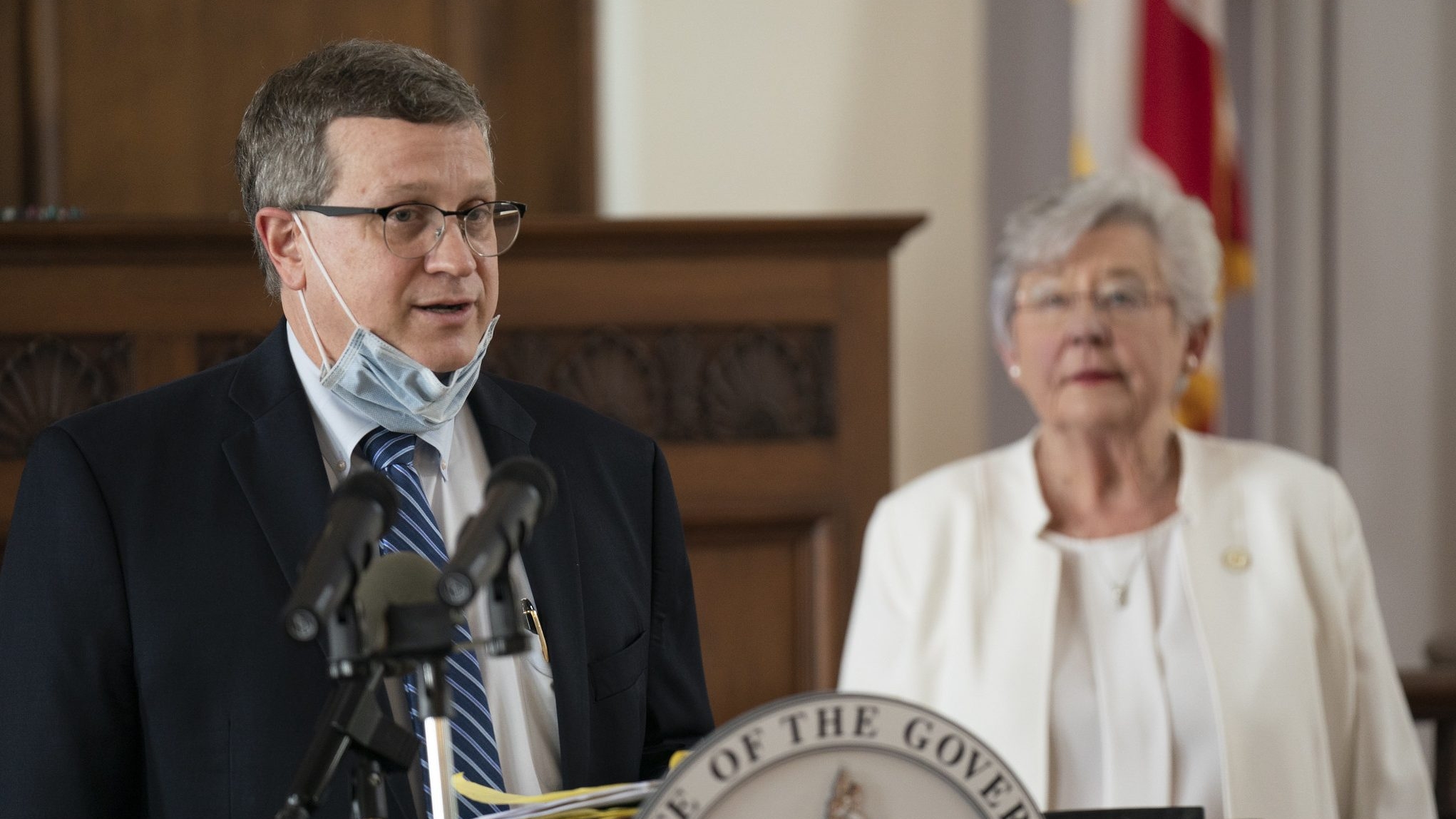Alabama ranks last in the nation in administering COVID-19 vaccines per 100,000 residents, but the state’s top health official says there’s more vaccine in Alabama now than ever before, and before the end of April, there will be enough for anyone who wants a shot to get one.
The CDC on Wednesday placed Alabama last, at 35,257 vaccinations per 100,000 Alabamians, which is close to four other southern states. Georgia had vaccinated 36,316 residents per 100,000. Tennessee and Mississippi were at 38,882 and 39,210 respectively.
Alabama State Health Officer Dr. Scott Harris told APR on Wednesday that the state’s ranking is due in part to a slow rollout initially, with few providers able to store and administer the vaccines.
“We only had a handful of locations that could handle Pfizer when we got it back in December,” Harris said. “Once you get to the back of the pack no matter how fast people are giving things out, it’s hard to move forward.”
Harris noted that Alabama isn’t last in all categories of vaccinations, however, and the margins between several southern states are slim. Georgia had fully vaccinated 11.4 percent of the state’s population as of March 26, while Alabama had vaccinated 12.5 percent. Mississippi had fully vaccinated 13.2 percent of the state’s population. Most of the states at the bottom of the rankings are in the South.
“It is clearly not a coincidence that the states in the Southeastern United States are the ones that are lagging behind the rest of the country, and that’s not a new phenomenon,” Harris said.
Higher poverty rates, lower literacy rates and higher numbers of poorer health outcomes and access to care all are coming to bear in states’ fight against COVID-19, Harris explained.
“We have less access to care because in most cases these aren’t Medicaid expansion states, and so all those same determinants affect your ability to do anything medical,” Harris said.
Early on the demand for vaccines was too high to determine what, if any, role vaccine hesitancy was playing in Alabama, Harris said. That’s beginning to change, and some degree of vaccine hesitancy is being seen, Harris said, although he said they don’t yet have the data to better identify where, exactly, that hesitancy is.
Harris noted the state’s work to inform Black Alabamians about COVID-19 and vaccines, and the historical mistrust of the medical community that’s partially the result of the Tuskegee syphilis experiment, where the U.S. government began an experiment in 1932 using 600 Black men, unbeknownst to them, to study the effects of untreated syphilis.
“But I think all parts of the country have recognized the phenomenon of rural, white communities where people just don’t perceive COVID as much of a threat,” Harris said. “Or they’re more conservative about risk from the vaccine than they are from risk of the disease.”
While the percentage of Alabama’s vaccine doses that have gone to Black Alabamians — at 17.3 percent — is higher than the national average of 8 percent, according to the CDC, Alabama and many other states have incomplete vaccination data on race and ethnicity. In Alabama, 22 percent of vaccinations were recorded without that data. Nationwide, 47 percent of vaccinations have no race or ethnicity data, according to the CDC.
Harris said prior to COVID-19, the state’s Immunization Patient Registry with Integrated Technology program, which is used by providers to input all types of vaccination data, didn’t include race or ethnicity, and getting providers trained to include the data has taken some time. Many providers administering COVID-19 vaccines have never administered vaccines or used the state’s database, which also complicates matters, he explained.
Asked when Alabama might open COVID-19 vaccine eligibility to all, Harris said: “I think it’s sooner rather than later.”
President Joe Biden has set a goal for all states to open eligibility fully by May 1. Harris said the state will certainly meet that goal “but probably beat that deadline by a lot.”
Harris said the state has held several larger public health vaccination clinics this week, and the Alabama National Guard teams began last week traveling to rural areas and holding clinics, but said the state is seeing slightly less demand in those clinics than in the clinics held in February.
“Of course the guard is going to many rural communities that just aren’t densely populated, so we’re not expecting them to have thousands and thousands of shots today in these smaller communities,” Harris said. “But at the same time, there is a little bit of vaccine accumulation that makes us think that expanding sooner rather than later is a good idea.”
Even with slightly less demand in the larger clinics, many Alabamians continue to have trouble finding an appointment to be vaccinated. Many county health departments are often booked well in advance, and pharmacies participating in the federal vaccination program do have slots, but some still have trouble navigating the process.
Harris asked the public to not give up on their hunt and said many parts of the state have plenty of vaccines.
“We’ve done big, no appointment walk-up clinics in all of our health districts this week,” Harris said, adding that more vaccines have been flowing into pharmacies from the federal government as well.
“There’s just a lot more vaccine now than even a month ago, so even if you’re not able to get a vaccine immediately right there in your own community, keep looking for opportunities for walk-up clinics or drive-up clinics,” Harris said. “If you have access to transportation just do a search in adjacent counties and I think there’s a really good chance that most people can find an appointment.”
“By the end of April I can tell you, anybody who wants to find one is going to be able to find one, because we’re going to have enough supply, probably will before the end of April,” Harris said.













































